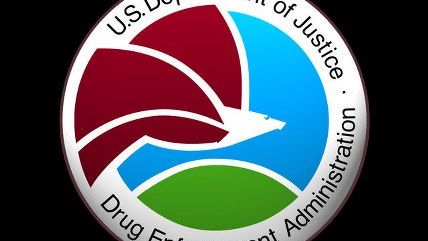The Drug War, Not Terrorism, Brought Us Mass Surveillance
The DEA was collecting mass numbers of Americans' foreign calls prior to Sept. 11.

Well, here's a corker: Federal officials from the Drug Enforcement Agency (DEA) and the Department of Justice (DOJ) are actually the source of our current domestic mass metadata collection madness, not the National Security Agency (NSA). The NSA got the idea from them. It turns out the DEA had been engaged in mass metadata collection of all phone calls originating from the United States to many foreign countries all the way back in the 1990s, a decade before the Sept. 11 terrorist attack. Of course, the reason back then was to fight the unwinnable drug wars. The DEA needed to know about your call to your aunt who lives in Italy in order to track down international drug cartels, obviously.
The details come courtesy of USA Today's Brad Heath, who interviewed a host of anonymous government sources:
For more than two decades, the Justice Department and the Drug Enforcement Administration amassed logs of virtually all telephone calls from the USA to as many as 116 countries linked to drug trafficking, current and former officials involved with the operation said. The targeted countries changed over time but included Canada, Mexico and most of Central and South America.
Federal investigators used the call records to track drug cartels' distribution networks in the USA, allowing agents to detect previously unknown trafficking rings and money handlers. They also used the records to help rule out foreign ties to the bombing in 1995 of a federal building in Oklahoma City and to identify U.S. suspects in a wide range of other investigations.
The Justice Department revealed in January that the DEA had collected data about calls to "designated foreign countries." But the history and vast scale of that operation have not been disclosed until now.
The program was discontinued in 2013 after the outrage of Edward Snowden's revelations. According to Heath, the program was also "suffering from diminishing returns," as there were now so many different ways for drug smugglers to communicate outside of the telephone.
Heath's investigation also reveals that the concept of "parallel construction" also predates the NSA outrage. That's the method where government officials used information gained from this mass surveillance to secure arrests, but then deliberately concealed the source of this information from the court in order to keep it all secret (and incidentally to keep defendants from challenging the evidence):
To keep the program secret, the DEA sought not to use the information as evidence in criminal prosecutions or in its justification for warrants or other searches. Instead, its Special Operations Division passed the data to field agents as tips to help them find new targets or focus existing investigations, a process approved by Justice Department lawyers. Many of those tips were classified because the DEA phone searches drew on other intelligence data.
That practice sparked a furor when the Reuters news agency reported in 2013 that the DEA trained agents to conceal the sources of those tips from judges and defense lawyers. Reuters said the tips were based on wiretaps, foreign intelligence and a DEA database of telephone calls gathered through routine subpoenas and search warrants.
As a result, "the government short-circuited any debate about the legality and wisdom of putting the call records of millions of innocent people in the hands of the DEA," American Civil Liberties Union lawyer Patrick Toomey said.
Is this a big deal or another "Let me put on my surprised face" moment? And as we all know, all those arrests they may credit to this program has done absolutely nothing to stop the flow, demand, or availability of illegal drugs in the United States.
Read the full story here. Jacob Sullum took note of the existence of the program back in January, but the full extent of the program was not revealed then.


Show Comments (47)